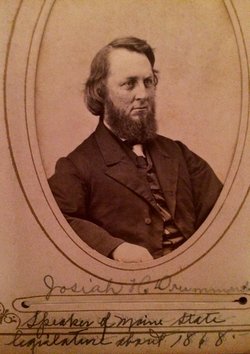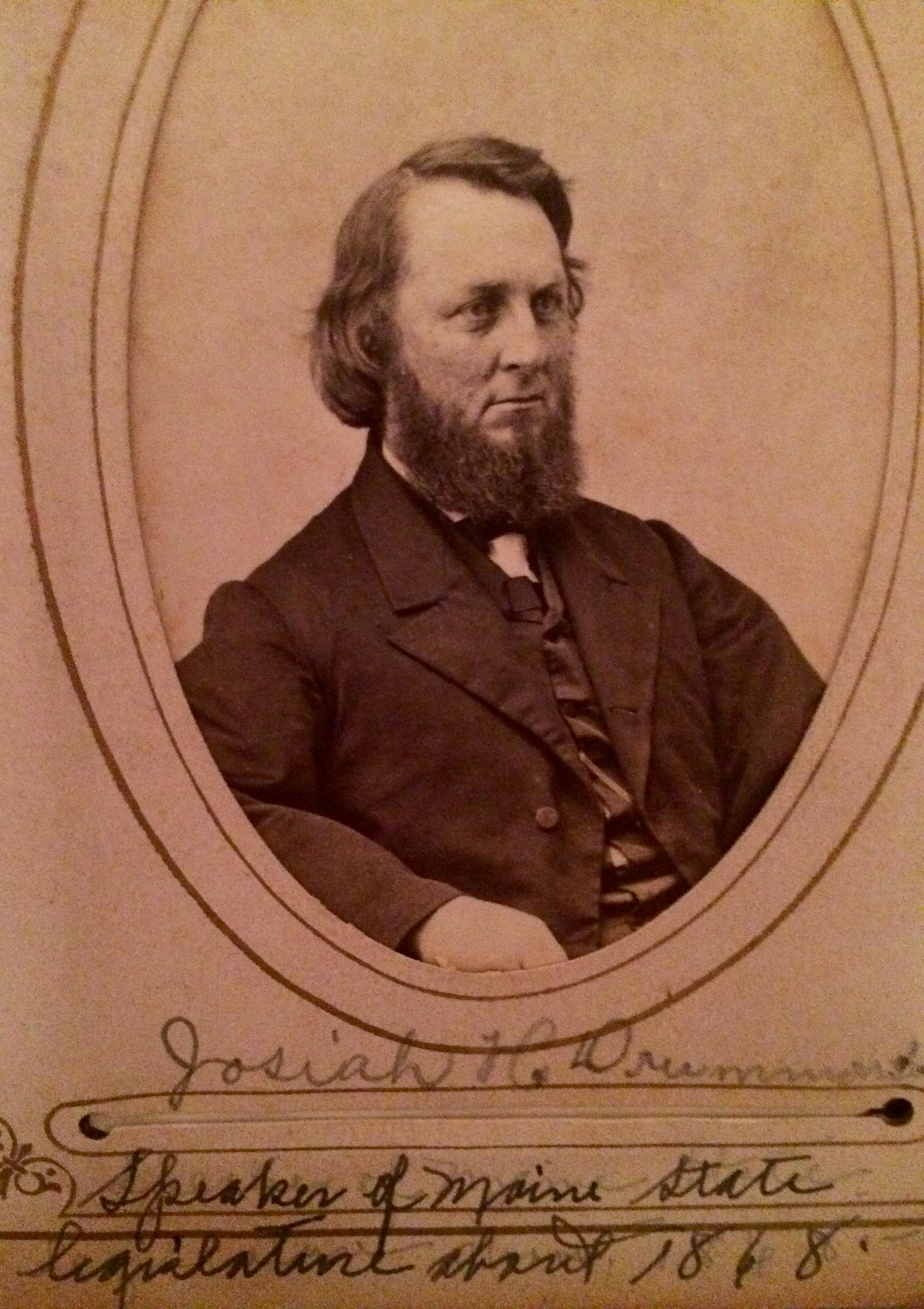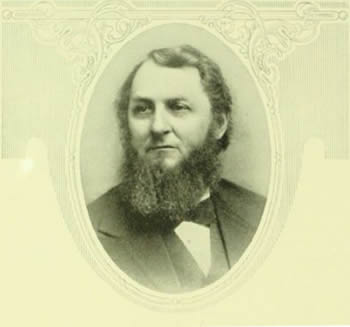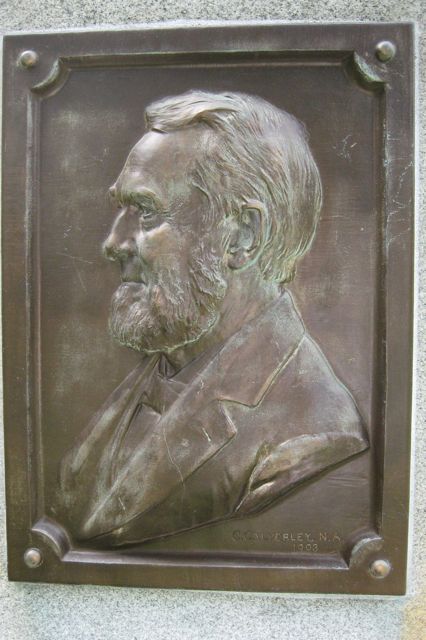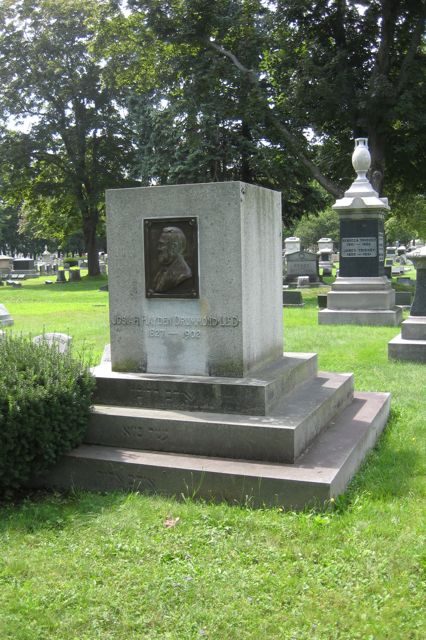BROTHER JOSIAH HAYDEN DRUMMOND was born in the town of Winslow, County of Kennebec, Maine, August 20, 1827. He was educated at Vassalboro Academy and Waterville College: from the latter he graduated with honor in 1846. He took up law as a profession and soon, despite his youth, won a place among the brainy men of his profession, and at the height of his powers was known as one of the leaders in legal circles. He served in the legislature of his state for several sessions, both as representative and as senator. He was Speaker of the House and also Attorney General of the state. He was so popular with the people of Maine that they were always asking him to accept new responsibilities and honors. He had the reputation of not accepting law cases of immoral or seditious nature. Oftentimes he gave his services gratuitously. He specialized in corporation cases and in life insurance law. Men of higher character may have lived but I have never met one.
Brother Drummond was descended from Revolutionary ancestry, his insignia in the Sons of the American Revolution being 6304. His ancestors Micau Blackwell and Thos. Burgess were members of Freeman's Massachusetts Regiment. He was an active member of the New England Historical Society and was one of the founders of the Maine society of the Sons of the American Revolution. It was to these patriotic organizations and to Freemasonry that he devoted most of his time and energy from his profession.
The most condensed account of Brother Drummond's Masonic career is that contributed by Brother Robert F. Gould to Ars Quatuor Coronatorum, volume X, page 167, and I can do no better than to quote the entire passage:
"Our Brother was initiated, passed, and raised in Waterville Lodge No. 33, on three successive Wednesday evenings, the first ceremony of all occurring on New Year's Day, 1849. 'Whether we made suitable proficiency or not,' he remarks in later years, when criticizing the decision of a Grand Master not to shorten the time between the degrees, 'our greatest difficulty ever since in giving the work has been to avoid giving it as we then learned it.' In 1856 and 1857 he filled the chair of his Mother Lodge, and has continued a member of it to the present day. From 1858 to 1860 he served as Deputy, and from the latter year to 1863, as Grand Master, of the Grand Lodge of Maine.
"For two years he presided over the Grand Chapter and Grand Commandery, and for one year over the Grand Council, of Maine. In 1871, he was elected from the floor to the leading office in the General Grand Chapter, and in 1880 to that of the General Grand Council, of the United States. Each of these positions he retained for three years. On the establishment of a Provincial Grand Lodge of the Royal Order of Scotland, in the U. S. A., he was appointed 'Deputy,' under the illustrious Albert Pike, at whose death he succeeded to the Provincial Grand Mastership.
"The degrees of the Ancient and Accepted Scottish Rite were conferred upon him in 1859 and 1862. In the latter year he received the Thirty-third Degree, and was elected Lieutenant Grand Commander of the Supreme Council (Northern Jurisdiction) of the United States. This compliment was repeated in 1863, and again in 1866. In the following year, on the amalgamation of the two Supreme Councils (N. J.), he was elected Grand Commander of the United Body, and reelected in 1870, 1873, and 1876, but declined further service in 1879…
Brother Drummond's last appearance in Washington, D. C., was in 1891, when he unveiled a monument to Albert Pike. He said the event was one of great joy to him and that he was glad his life had been spared to take part in the dedication of the monument to that great and good Mason.
His name was celebrated-by many eulogies after his death, which occurred October 25, 1902. It was said of him that the most beautiful thing in his life was his loyalty to his family and that it was his practice on various family anniversaries to spend the entire day at home during which time he denied himself to callers and to business engagements.
His Sovereign Grand Commander said of him, after death: "We may say to the world that Brother Drummond lived a true, just, affectionate, self-faithful life, from the motive of a good man. As a citizen, a statesman, a Christian, a Freemason, and a lover of his country, he faithfully and conscientiously performed every duty incumbent upon him, and this solely because it was a duty. By his life he honored his state, his profession and his Fraternity. By it he completed for himself a monument more lasting than brass, more sublime than the regal elevation of the Pyramids, which neither the wasting shower, the unavailing north winds and the flight of seasons shall be able to demolish."
BROTHER JOSIAH HAYDEN DRUMMOND was born in the town of Winslow, County of Kennebec, Maine, August 20, 1827. He was educated at Vassalboro Academy and Waterville College: from the latter he graduated with honor in 1846. He took up law as a profession and soon, despite his youth, won a place among the brainy men of his profession, and at the height of his powers was known as one of the leaders in legal circles. He served in the legislature of his state for several sessions, both as representative and as senator. He was Speaker of the House and also Attorney General of the state. He was so popular with the people of Maine that they were always asking him to accept new responsibilities and honors. He had the reputation of not accepting law cases of immoral or seditious nature. Oftentimes he gave his services gratuitously. He specialized in corporation cases and in life insurance law. Men of higher character may have lived but I have never met one.
Brother Drummond was descended from Revolutionary ancestry, his insignia in the Sons of the American Revolution being 6304. His ancestors Micau Blackwell and Thos. Burgess were members of Freeman's Massachusetts Regiment. He was an active member of the New England Historical Society and was one of the founders of the Maine society of the Sons of the American Revolution. It was to these patriotic organizations and to Freemasonry that he devoted most of his time and energy from his profession.
The most condensed account of Brother Drummond's Masonic career is that contributed by Brother Robert F. Gould to Ars Quatuor Coronatorum, volume X, page 167, and I can do no better than to quote the entire passage:
"Our Brother was initiated, passed, and raised in Waterville Lodge No. 33, on three successive Wednesday evenings, the first ceremony of all occurring on New Year's Day, 1849. 'Whether we made suitable proficiency or not,' he remarks in later years, when criticizing the decision of a Grand Master not to shorten the time between the degrees, 'our greatest difficulty ever since in giving the work has been to avoid giving it as we then learned it.' In 1856 and 1857 he filled the chair of his Mother Lodge, and has continued a member of it to the present day. From 1858 to 1860 he served as Deputy, and from the latter year to 1863, as Grand Master, of the Grand Lodge of Maine.
"For two years he presided over the Grand Chapter and Grand Commandery, and for one year over the Grand Council, of Maine. In 1871, he was elected from the floor to the leading office in the General Grand Chapter, and in 1880 to that of the General Grand Council, of the United States. Each of these positions he retained for three years. On the establishment of a Provincial Grand Lodge of the Royal Order of Scotland, in the U. S. A., he was appointed 'Deputy,' under the illustrious Albert Pike, at whose death he succeeded to the Provincial Grand Mastership.
"The degrees of the Ancient and Accepted Scottish Rite were conferred upon him in 1859 and 1862. In the latter year he received the Thirty-third Degree, and was elected Lieutenant Grand Commander of the Supreme Council (Northern Jurisdiction) of the United States. This compliment was repeated in 1863, and again in 1866. In the following year, on the amalgamation of the two Supreme Councils (N. J.), he was elected Grand Commander of the United Body, and reelected in 1870, 1873, and 1876, but declined further service in 1879…
Brother Drummond's last appearance in Washington, D. C., was in 1891, when he unveiled a monument to Albert Pike. He said the event was one of great joy to him and that he was glad his life had been spared to take part in the dedication of the monument to that great and good Mason.
His name was celebrated-by many eulogies after his death, which occurred October 25, 1902. It was said of him that the most beautiful thing in his life was his loyalty to his family and that it was his practice on various family anniversaries to spend the entire day at home during which time he denied himself to callers and to business engagements.
His Sovereign Grand Commander said of him, after death: "We may say to the world that Brother Drummond lived a true, just, affectionate, self-faithful life, from the motive of a good man. As a citizen, a statesman, a Christian, a Freemason, and a lover of his country, he faithfully and conscientiously performed every duty incumbent upon him, and this solely because it was a duty. By his life he honored his state, his profession and his Fraternity. By it he completed for himself a monument more lasting than brass, more sublime than the regal elevation of the Pyramids, which neither the wasting shower, the unavailing north winds and the flight of seasons shall be able to demolish."
Family Members
Sponsored by Ancestry
Advertisement
Advertisement
